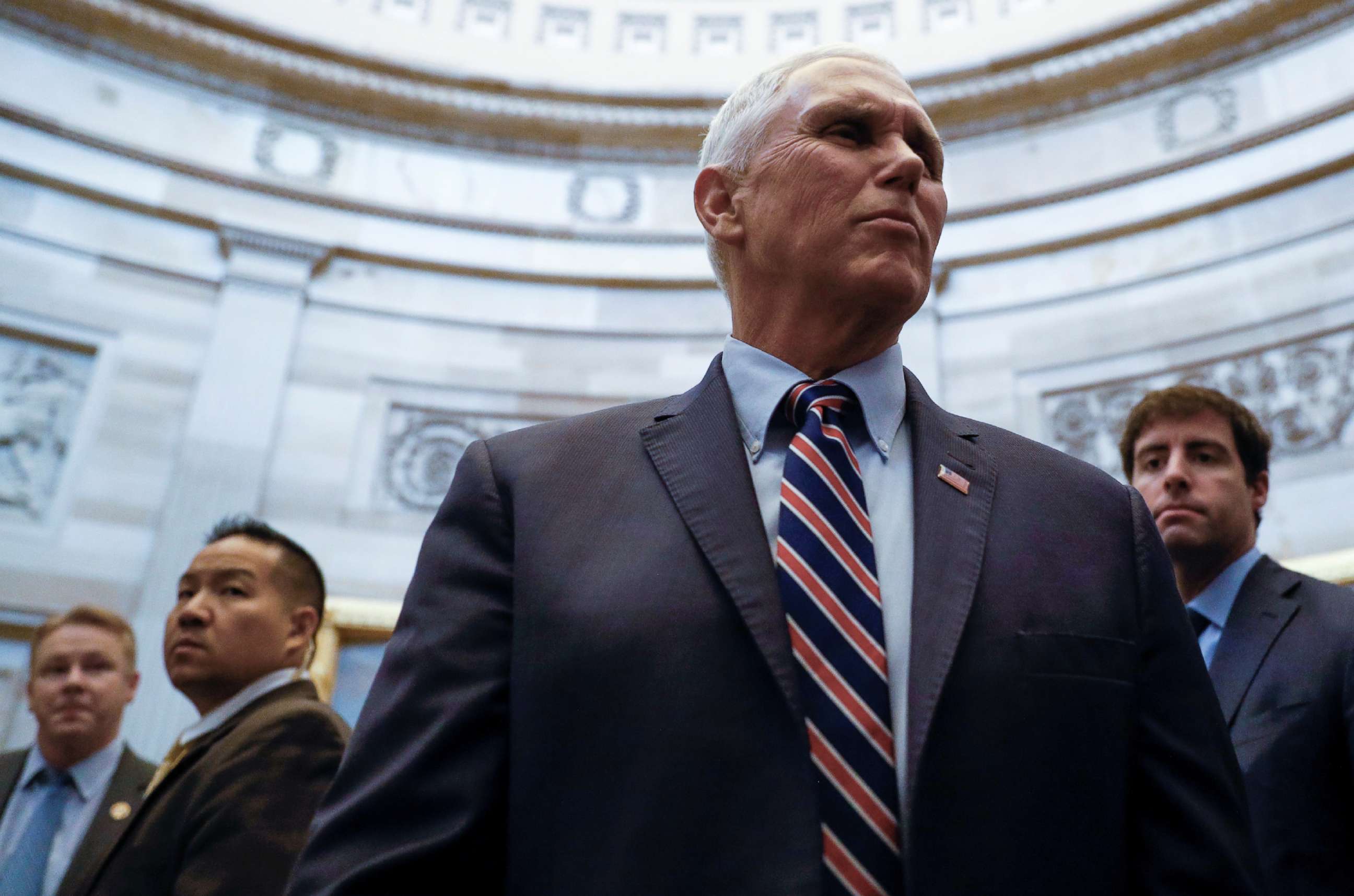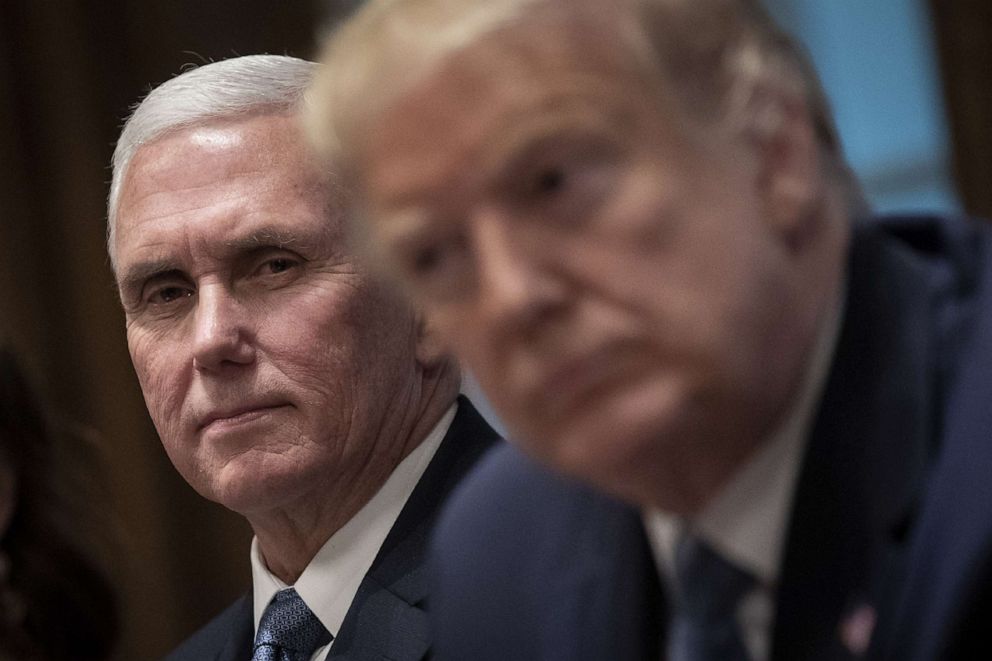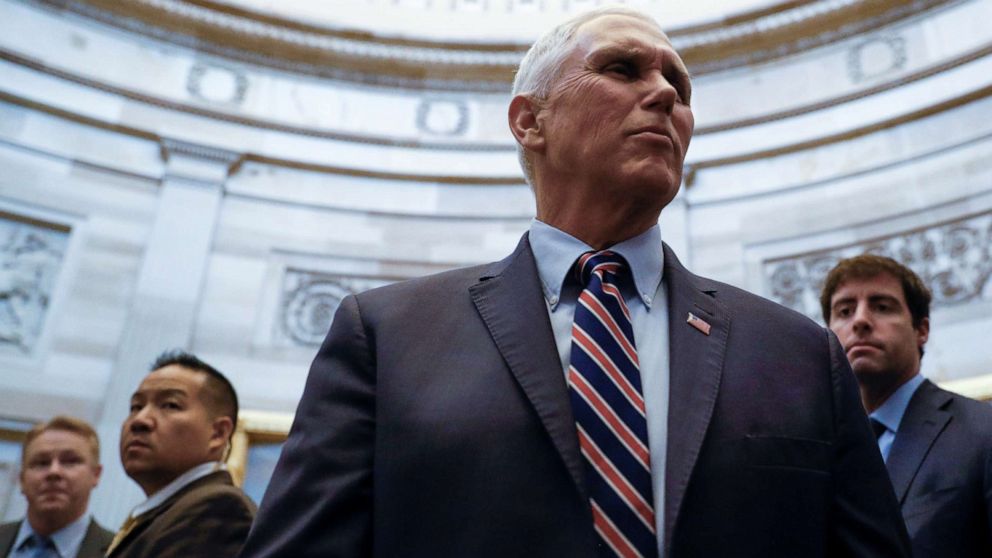Pence floats possibility of releasing documents Democrats requested, hours before impeachment vote
Vice President Mike Pence signaled his willingness to declassify his special adviser’s supplemental and classified testimony provided to House impeachment investigators in an interview with ABC News, after House Intelligence Committee Chairman Adam Schiff urged the vice president to do so in a renewed request.
"Well, we may," Pence said about releasing the testimony of Jennifer Williams, his special adviser on Europe and Russia, in an interview with ABC News’ Rachel Scott on Wednesday, hours before the U.S. House is expected to vote to impeach President Donald Trump -- only the third time in American history a president has faced that fate.
"But the fact that after his sham investigation is over, Adam Schiff is now asking for more information -- information his committee already has and then, frankly, those that will consider his articles of impeachment if it makes it to the Senate already have -- says everything you need to know about this investigation, about this partisan impeachment," Pence said.
Williams previously testified before the House Intelligence Committee that she thought the president's words on the phone with Ukrainian President Volodymyr Zelenskiy were "unusual and inappropriate" because it involved targeting a political rival.
The vice president sat down for an interview with ABC News aboard his campaign bus en route to Battle Creek, Michigan, ahead of President Trump’s campaign rally on Wednesday night.
Despite his staunch defense of the president amid the looming threat of impeachment, when pressed repeatedly about Trump’s July phone call with Zelenskiy that sits at the heart of the impeachment investigation, the vice president deflected about whether he would characterize the call as "perfect," which was the word used by Trump to describe the conversation.

"I think the president in the call was focusing on issues that mattered to our country. He spoke to President Zelenskiy about issues that were a concern to us," Pence said.
When asked again about if he would describe the call as "perfect," he refused to say so, only asserting, "I think the president did nothing wrong."
Pence went on to argue that what Trump "did here was simply raise issues that were important to the United States."
"The president's primary focus here -- all of his dealings that he instructed me to have with Ukraine, were focused on President Zelenskiy’s goal of bringing an end to decades of corruption in that country and also enlisting more European support," he said. "President Zelenskiy committed to those things, and when he did that, the president was pleased to release all the funding."
But several witnesses who testified before the House Intelligence Committee argued that the requests the president made to the Ukrainian leader ran contradictory to other coordinated, anti-corruption efforts that U.S. officials were working on in Ukraine.
During his phone call with the Ukrainian President, Trump made two specific requests: one was to investigate former Vice President Joe Biden, and his son, Hunter, and the other to look into the "Crowdstrike server" a reference to a debunked theory that Ukraine had interfered in the U.S. election and was holding stolen emails from the Democratic National Committee or missing emails from Hillary Clinton.
Fiona Hill, a former White House Russia expert and member of Trump's National Security Council, testified before the House Intelligence Committee that the theory of Ukraine interfering in the 2016 election was false and that several senior advisers close to the president, including herself, all agreed and relayed that opinion to the Oval Office.
Gordon Sondland, the U.S. ambassador to the European Union, also argued that the president's team was concerned about an announcement of an investigation into corruption by Ukrainian leaders, not necessarily more investigations. Sondland said he never heard anyone with the president's team say that investigations into possible corruption in Ukraine had to "start or be completed for the White House to withhold the aid."
"The only thing I heard from Mr. Giuliani or otherwise, was that they had to be announced in some form," Sondland continued. His statement, arguing that the White House was only worried about an announcement of an investigation, stands in stark contrast to the vice president's argument that Trump was focused on rooting out corruption.

As House members on both sides engaged in a full day of debate over Trump’s impeachment back in Washington before a final vote in the Democrat-led House, Pence assailed Democrats, calling Wednesday's events a "disgrace."
Democrats appear to have the votes needed to pass two articles of impeachment charging the president with abuse of power and obstructing Congress. The articles are expected to pass on party-line votes, teeing up a Senate trial in January.
"What was happening in the House of Representatives today is a disgrace ... Never before in history, have we seen a partisan impeachment, the likes of which will pass the House of Representatives today," he said.
"In this case you have a president who did nothing wrong. There was no crime, as there is, as was the case in the Nixon years and the Clinton years," he added.
During the interview, Pence disputed Sondland's claim about when Pence knew that the military aid to Ukraine was conditioned on Zelenskiy’s willingness to announce an investigation. Sondland testified that Pence was made aware just before a Sept. 1 meeting with the Ukrainian president.
"I was never aware of the allegation that military aid was tied to investigations until it became public," Pence said when asked about his understanding of why the military aid was held up. "And to this day, I don't believe it ever was. I mean, the president made it clear in a call to our ambassador to the EU, there was no quid pro quo. He wanted nothing."
"When the president asked me to represent him in a meeting in Poland with President Zelenskiy, he told me to focus on two issues. One was what President Zelenskiy was doing to add decades of corruption, which was what President Zelenskiy was elected on in a landslide election in the spring. And secondly, what he was doing to enlist more European support," he continued.
During the House impeachment investigation, however, witnesses testified that the Department of Defense had certified that the Ukraine had met anti-corruption benchmarks that the country needed to pass in order qualify for the aid, which was approved by Congress.
Pence also hedged on if he thought Trump asking a foreign leader to investigate a domestic political rival was appropriate, instead asserting, "I don't think that's what the president did. I think what the president asked President Zelinskiy to do was investigate potential corruption and election interference in our 2016 election. It was all about looking backwards, not looking forwards."
Pence is spending his day on a bus tour through the key battleground state of Michigan, which helped solidify Trump's victory in 2016 after he carried the state by a mere two-tenths of a percentage point, seeking to engage with voters directly. Before heading to his next campaign stop of the day and finally the "Keep America Great" rally alongside Trump, Pence gave some insights into the White House’s reelection strategy, telling ABC News that the Great Lakes State is "enormously important" to their 2020 campaign.
"Michigan is enormously important to our reelection campaign just as much as it was in 2016. But I have to tell you, in Saginaw today, the crowd that we’ll see in Battle Creek tonight, we just sense tremendous momentum all across Michigan," he said.
As Democrats target suburban voters in 2020 -- a key voting demographic that was once the bedrock of the Republican Party but has been shifting away from the party in the Trump era -- Pence touted his and Trump’s commitment to traveling to every part of the country throughout next year.
"Every day between now and Election Day, the president and I are gonna be carrying our message in the city and on the farm, in the suburbs of this country, on the highways and byways," he said. "We’ve got a winning message."
ABC News' MaryAlice Parks, Benjamin Siegel and Anne Flaherty contributed to this report.




